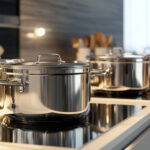Eco-Friendly Cookware: Best Sustainable Pots and Pans for 2025

Did you know that traditional pots and pans often contain toxic chemicals like PFOA and PTFE, which can leach into your food and harm your health and the environment during production? By switching to sustainable cookware, you’re investing in your family’s well-being while taking a step toward reducing needless waste and pollution.
Eco-friendly cookware is durable, stylish, and carefully crafted to help you cook confidently. Whether you’re sautéing vegetables or simmering sauces, these products will elevate your cooking experience while promoting ethical and eco-conscious living.
So, if you’re ready to choose cookware that’s safer for your family and better for the Earth, you’ve come to the right place. We’ll introduce you to the best sustainable cookware options for 2025 and help you find the perfect eco-friendly pots and pans to transform your kitchen and your impact on the world.
The Growing Importance of Sustainability in Kitchenware
The importance of sustainability has never been more evident. Increasing concerns about climate change, resource depletion, and excessive waste have driven consumers toward eco-conscious decisions, even in everyday habits like cooking. Traditional cookware is often made from materials or coatings harmful to the environment, such as non-recyclable synthetics or chemically laden finishes. By switching to sustainable cookware, you’re enhancing your kitchen experience and contributing to a healthier planet.
Sustainable cookware emphasizes ethically sourced, non-toxic materials that are easily recyclable or biodegradable at the end of their lifespan. These products are typically manufactured using processes aimed at reducing waste and energy consumption. Incorporating eco-friendly pots and pans into your kitchen helps lessen environmental impact and supports brands advocating for a green revolution in cookware design.
Overview of Eco-Friendly Materials and Their Benefits
Eco-friendly cookware is crafted from materials intended for functionality, durability, and a reduced environmental footprint. Some of the most popular sustainable materials include:
- Recycled Aluminum
Recycled aluminum cookware uses repurposed materials to minimize mining and waste. It provides excellent heat conductivity, ensuring energy-efficient cooking. - Stainless Steel
Stainless steel pots and pans are not only durable but also recyclable. High-quality stainless steel is produced with minimal environmental impact, making it an excellent choice for eco-conscious kitchens. - Ceramic cookware
is valued for its non-toxic, chemical-free coatings. It is often crafted from natural, sustainable materials and provides excellent cooking results without harmful additives.
- Cast Iron
Cast iron is exceptionally durable, often lasting for generations when properly cared for, thus minimizing the need for constant replacements. Many brands now provide recycled or sustainably produced cast iron options. - Natural Stone-Derived Coatings
Some modern cookware lines feature eco-friendly, stone-derived coatings with a non-stick surface free from harmful chemicals like PFAs and PTFE. - Bamboo Accessories
Bamboo is a rapidly growing renewable resource commonly used for handles and utensils. Incorporating it into cookware adds an extra layer of sustainability.
These eco-friendly materials provide outstanding performance in the kitchen and guarantee that your cooking habits contribute to protecting the planet. By choosing sustainable cookware, you invest in products made for durability, efficient cooking, and minimizing waste.
Cast Iron Skillets: The Ultimate Guide to Buying in 2025
Factors to Consider When Choosing Sustainable Cookware
When selecting sustainable cookware, looking beyond the brand name or a simple “Green” label is essential. Genuine eco-friendliness requires assessing the materials, production processes, and the long-term impact of your choice. Here are the key factors to consider when shopping for sustainable pots and pans:
Non-Toxic Materials: Avoiding Harmful Chemicals Like PFOA and PTFE
One crucial factor to prioritize is non-toxic materials. Many traditional non-stick pots and pans use coatings such as PTFE (Teflon) or PFOA, which release harmful chemicals into the environment and your food when overheated. These synthetic coatings are neither biodegradable nor recyclable, making them environmentally unfriendly.
Instead, look for cookware with natural ceramic coatings or toxin-free options that offer excellent non-stick performance without health risks. For example, ceramic-coated pans use sand-derived coatings that are free from lead, cadmium, and other potentially harmful substances. By choosing non-toxic cookware, you protect both your family and the environment.
Durability and Longevity: Investing in Long-Lasting Products to Reduce Waste
Durability serves as a cornerstone of sustainability. Although high-quality cookware may carry a higher initial cost, it proves to be a worthwhile investment by minimizing the need for frequent replacements. In contrast, low-quality cookware wears out quickly and often ends up in landfills, contributing to long-term waste.
Materials like cast iron, stainless steel, and heavy-duty recycled aluminum are recognized for their durability. With appropriate care, a cast iron skillet can endure for generations. By choosing cookware made for longevity, you actively reduce waste and minimize your overall environmental impact.
Recyclability and Environmental Impact: Selecting Materials That Are Recyclable and Have a Lower Environmental Footprint
Not all cookware materials have the same environmental impact. When selecting eco-friendly cookware, look for products made from recyclable or upcycled materials. Recycled aluminum and stainless steel are excellent choices, as they conserve natural resources and significantly reduce the need for raw-material extraction.
Additionally, some brands offer closed-loop recycling programs that enable the return of old cookware for repurposing. This practice reduces landfill waste and provides peace of mind, knowing you are contributing to a sustainable cycle. Always select materials that are both functional and easy to recycle at the end of their useful life.
Ethical Manufacturing Practices: Supporting Brands with Sustainable and Ethical Production Processes
Sustainability goes beyond just the materials used; it also includes the manufacturing process. Ethical brands prioritize renewable energy sources, reduce factory waste, and follow fair labor practices. By supporting companies that maintain transparent and sustainable production, you endorse practices that respect both the planet and the workers who produce the products.
Many eco-conscious brands are certified by organizations such as Fair Trade, GOTS (Global Organic Textile Standard), or B Corp. These certifications ensure that the cookware you buy is produced in environmentally and socially responsible ways. Research the companies you support, prioritizing those that excel in ethical, sustainable production.
We also recommend you to read: Calphalon Cookware in 2025: Why It’s Still a Top Choice for Home Chefs
Top Eco-Friendly Cookware Brands of 2025
As consumers demand greener kitchen options, several brands have emerged as leaders in sustainable cookware. These companies blend innovative designs, eco-friendly practices, and high-performance materials to create products that benefit both the environment and your cooking experience. One standout brand is Caraway, which has gained recognition for its commitment to style, sustainability, and safety.
Caraway
Caraway has built a reputation as a modern leader in sustainable cookware. The brand emphasizes the delivery of non-toxic, eco-friendly products while maintaining both functionality and aesthetics.
- Features:
Caraway cookware features a ceramic-coated, non-stick surface that is free from harmful chemicals such as PTFE, PFOA, and other toxic materials. The core consists of aluminum and is paired with a mineral-based coating, which ensures the cookware is safe for both your health and the environment. Even the packaging is eco-friendly, utilizing recycled cardboard and containing zero plastic. - Pros:
- Excellent heat distribution for consistent cooking.
- Sleek and stylish design is available in various colors to complement your kitchen.
- Made with non-toxic, eco-friendly materials.
- Cons:
- Comes at a higher price point compared to conventional cookware.
- It is not metal utensil-safe, as the ceramic coating can scratch easily.
- Notable Products:
- Caraway’s 12-Piece Nonstick Cookware Set: This popular collection includes everything a home chef needs, featuring frying pans, saucepans, and Dutch ovens. It offers impressive performance while maintaining its commitment to sustainability.
GreenPan
GreenPan is a leading innovator in eco-friendly cookware, recognized for introducing ceramic non-stick technology to the market. The brand emphasizes developing safe, high-performance products that minimize environmental impact while delivering exceptional cooking experiences.
- Features:
GreenPan is renowned for its Thermolon ceramic coating, derived from sand, which replaces traditional non-stick surfaces that often contain harmful chemicals. Their cookware is free from toxic substances such as PFAS, PFOA, lead, and cadmium, making it a safer and more sustainable choice for eco-conscious cooks. Furthermore, GreenPan products are designed to emit fewer CO2 emissions during manufacturing, reinforcing their commitment to sustainability. - Pros:
- Completely non-toxic, ensuring that no harmful chemicals are released during cooking.
- Offers a diverse selection of cookware, from frying pans to complete sets, accommodating different needs and budgets.
- Uniform cooking results from consistent heat distribution.
- Cons:
- Certain users express concerns about durability, particularly related to the ceramic coating chipping or deteriorating over time.
- Needs careful handling, such as avoiding high temperatures or metal utensils, to ensure the coating lasts longer.
- Notable Products:
- GreenPan Valencia Pro Ceramic Nonstick Skillet: This versatile skillet is an excellent choice for daily cooking. Its non-toxic surface ensures easy cleanup and dependable non-stick performance.
Made In
Made In is a premium cookware brand that bridges the gap between professional-grade performance and sustainable practices. By collaborating with skilled artisans and prioritizing high-quality materials, Made In offers cookware designed to last, making it an excellent choice for eco-conscious consumers.
- Features:
Made In offers a diverse range of cookware, including stainless steel, carbon steel, and non-stick options, all designed with durability and functionality. Their products are made from high-performance materials and undergo meticulous manufacturing processes. Made In proudly partners with craftspeople worldwide to ensure ethical production standards and exceptional craftsmanship. - Pros:
- Constructed from durable, high-quality materials designed to last, significantly minimizing the need for replacements.
- Provides professional-grade performance, appreciated by chefs and culinary enthusiasts alike.
- Highlights ethical manufacturing practices and transparency in sourcing materials.
- Cons:
- Narrow selection of non-toxic, non-stick cookware compared to other eco-friendly brands.
- Products fall into a higher price range, which makes them less accessible for budget-conscious buyers.
- Notable Products:
- Made from Stainless-Clad Saucier, this pan is Perfect for delicate sauces or custards. It blends durability and precision to achieve professional-grade results.
- Blue Carbon Steel Wok: This lightweight and versatile alternative to cast iron is ideal for high-heat cooking, such as stir-frying. Its carbon steel construction supports sustainability.

Lodge Cast Iron
Lodge is a heritage brand that has produced high-quality cast iron cookware since 1896, making it one of the most trusted names in durable and sustainable kitchenware. Known for its rugged cookware, Lodge stands out as a top choice for eco-friendly kitchens because of its commitment to simple, natural materials and long-lasting products.
- Features:
Lodge specializes in cast iron cookware designed to endure for generations. Their products are pre-seasoned with 100% natural vegetable oil, providing a naturally non-stick surface free from synthetic or harmful coatings. Cast iron is recyclable and exceptionally durable, making Lodge cookware a cornerstone of sustainable cooking. - Pros:
- Extreme durability: A well-maintained Lodge cast iron skillet can endure for a lifetime, minimizing the necessity for replacements and decreasing consumer waste.
- Excellent heat retention: Cast iron evenly distributes and retains heat, producing professional-quality cooking for everything from searing to baking.
- Naturally non-stick when seasoned correctly, removing the necessity for chemical coatings.
- Cons:
- Maintenance: Cast iron needs regular seasoning to maintain its non-stick properties, which may present a learning curve for some users.
- Heavier than other materials: Cast iron cookware’s weight may not suit everyone, particularly those who favor lighter pots and pans.
- Notable Products:
- Lodge 10.25-inch Cast Iron Skillet: A versatile kitchen essential, ideal for tasks ranging from frying to baking. This skillet showcases Lodge’s quality craftsmanship and durability, making it an excellent addition to any sustainable kitchen.
Le Creuset
Le Creuset is an iconic name in the cookware world, celebrated for its high-quality enameled cast iron products that combine elegance, durability, and eco-friendliness. With a nearly a century history, Le Creuset exemplifies sustainable luxury by providing cookware designed to last a lifetime while minimizing environmental impact.
- Features:
Le Creuset specializes in enameled cast iron cookware that is free from harmful chemicals such as lead and cadmium. The enamel coating removes the need for seasoning, making it easier to maintain than traditional cast iron. Additionally, their cookware ensures even heat distribution, providing superior cooking performance for everything from soups to roasts. - Pros:
- Incredibly durable: Designed to endure for decades, minimizing the need for replacements and promoting sustainability.
- Versatile: Ideal for various cooking applications, such as stovetop use, oven baking, and even serving.
- Aesthetic appeal: With a range of vibrant colors available, Le Creuset brings a touch of elegance to any kitchen.
- Non-toxic and safe: The enamel coating contains no harmful chemicals, ensuring worry-free cooking.
- Cons:
- Premium pricing: Le Creuset products have a high price tag, representing a considerable investment.
- Heavier than alternatives: Their enameled cast iron cookware can be quite weighty, which may not suit all users perfectly.
- Notable Products:
- Le Creuset Enameled Cast Iron Dutch Oven: A timeless cookware piece designed for braising, baking, slow cooking, and beyond. This Dutch oven is valued for its versatility, durability, and beautiful design, making it an essential item in both professional and home kitchens.
You can also read ” Top 10 Cast Iron Skillet Recipes for Beginners “
Benefits of Using Eco-Friendly Cookware
Switching to eco-friendly cookware benefits the planet and your cooking experience while protecting your health and wallet. Here are the key advantages of incorporating sustainable pots and pans into your kitchen:
1. Health Advantages: Reducing Exposure to Toxic Chemicals
One of the most significant benefits of eco-friendly cookware is its non-toxic composition. Traditional non-stick cookware often contains harmful chemicals like PFOA, PTFE, or PFAS, which can leach into your food or release toxic fumes when overheating cookware. Eco-friendly cookware eliminates these risks using safe materials such as ceramic, stainless steel, cast iron, and recycled aluminum.
By opting for sustainable cookware, you can ensure better health for your family and avoid exposure to hazardous substances linked to long-term health issues. Cookware brands that use toxin-free coatings and materials provide peace of mind while still delivering high performance.
2. Environmental Impact: Lowering Carbon Footprint and Supporting Sustainable Practices
Eco-friendly cookware plays a vital role in minimizing harm to the environment. Sustainable options are often made from recyclable, renewable, or upcycled materials, significantly reducing waste and resource depletion. Brands that adopt ethical manufacturing practices, such as using renewable energy or implementing waste-reduction methods, further contribute to lowering the carbon footprint of your cookware.
By choosing eco-conscious products, you reduce landfill contribution and support the growing movement toward sustainability and environmentally responsible production. These choices encourage innovation in green manufacturing and pave the way for a cleaner and healthier planet.
3. Economic Benefits: Long-lasting products Reduce the Need for Frequent Replacements
While eco-friendly cookware might have a higher upfront cost, it offers significant economic benefits in the long run. These products are often designed for durability, meaning they last for years—if not decades—reducing the need for frequent replacements. Materials like cast iron, stainless steel, and high-quality ceramic are built to withstand heavy usage, saving you money over time compared to cheaper cookware that wears out quickly.
Investing in sustainable cookware aligns with eco-conscious living and benefits your budget. Less frequent replacements mean fewer products sent to landfills, further helping the environment.
Why Make the Switch?
Using eco-friendly cookware is a win-win solution: it promotes better health, protects the planet, and saves you money in the long term. By investing in sustainable materials and supporting ethical brands, you’re actively contributing to a greener lifestyle that benefits you and future generations.
Tips for Maintaining Sustainable Cookware
Investing in eco-friendly cookware is the first step; proper care is essential to ensure your pots and pans last for years while maintaining their performance and sustainability benefits. Here are some practical tips to help you care for and extend the lifespan of your sustainable cookware:
1. Proper Cleaning Techniques: Using Gentle Cleaners and Avoiding Abrasive Materials
One of the most effective ways to prolong the life of your cookware is to clean it carefully. Harsh cleaning methods can damage protective coatings, scratch surfaces, or reduce the efficiency of eco-friendly materials like ceramic or enameled cast iron. Here’s how to clean sustainably:
- Always use gentle cleaners free from harmful chemicals, such as baking soda, vinegar, or mild dish soap. These options preserve your cookware and align with your green lifestyle.
- Avoid abrasive materials like steel wool or rough brushes, which can scratch ceramic coatings or chip enamel surfaces. Instead, opt for soft sponges or cloths for cleaning.
- For stubborn stuck-on food, soak the cookware in warm water with a bit of soap rather than aggressively scrubbing.
2. Storage Recommendations: Ensuring Proper Storage to Prevent Damage and Extend Lifespan
Proper storage is crucial for preventing unnecessary wear and tear on your cookware and ensuring it remains functional for years:
- Stack cookware carefully to avoid scratching or denting surfaces, especially non-stick or enamel-coated items. If you do stack pots and pans, consider placing a protective layer (like a soft kitchen towel or pan protector) between them.
- Store cast iron cookware in a dry place to prevent rust. If seasoning is required, ensure it’s properly coated with oil before storing.
- Hanging racks for lightweight items like stainless steel pans or bamboo-handled cookware reduce clutter and allow airflow.
More tips in ‘ The Best Non-Stick Frying Pans of 2025: A Complete Guide ‘
3. Usage Guidelines: Following Manufacturer Instructions to Maintain Non-Stick Surfaces and Overall Integrity
Each type of cookware material—ceramic, cast iron, stainless steel, or recycled aluminum—has unique care requirements. To ensure longevity while maximizing performance, it’s essential to follow these usage guidelines:
- Avoid high heat: Many non-stick and ceramic-coated pans are designed for moderate heat and can degrade faster if exposed to extreme temperatures.
- Always use wooden, silicone, or plastic utensils to prevent scratching non-stick surfaces or enamel coatings. Avoid using metal utensils, even if they’re advertised as “safe” for the cookware.
- Cast iron cookware should maintain its seasoning by cooking with oil and avoiding prolonged use with acidic foods (like tomatoes) that can strip the seasoning.
- Adhere to manufacturer instructions for specific items, such as allowable oven temperatures or dishwasher compatibility, as specific cookware may be dishwasher-safe while others require hand washing.
Why Proper Maintenance Matters
Maintaining sustainable cookware isn’t just about ensuring it lasts longer—it’s also about continuing your investment in eco-conscious living. By taking steps to care for your cookware, you’re reducing waste, saving money, and maximizing performance, all while contributing to a greener lifestyle.
Conclusion
The shift toward eco-friendly cookware is more than just a trend—it’s a meaningful way to protect your health and the planet. Manufacturers like Caraway, GreenPan, Made In, Lodge Cast Iron, and Le Creuset have paved the way for kitchenware that prioritizes sustainability without sacrificing quality or performance. From ceramic coatings free of harmful chemicals to durable cast iron that lasts for generations, these options represent the best in sustainable cookware for 2025.
Switching to eco-friendly pots and pans offers numerous benefits, including reducing exposure to toxic materials, lowering carbon footprints, and minimizing waste through durable, long-lasting products. By making informed choices, you can invest in cookware that aligns with your green lifestyle while maintaining a high-quality cooking experience.
As we move toward a more environmentally conscious future, every decision matters—including the tools we use in our kitchens. By opting for sustainable cookware, you’re contributing to a healthier environment and supporting brands committed to responsible production. Let your next cookware choice reflect your values, and enjoy the satisfaction of cooking sustainably for yourself, your loved ones, and generations to come.
(FAQs)
- What makes cookware “eco-friendly”?
Eco-friendly cookware is often produced ethically from sustainable materials like recycled aluminum, stainless steel, ceramic, and cast iron. These products avoid harmful chemicals like PFOA and PTFE and prioritize durability, recyclability, and minimal environmental impact.
2. Is eco-friendly cookware safe for my health?
Yes, eco-friendly cookware is designed to be free from toxic chemicals like PFAS, PFOA, lead, and cadmium, which are commonly found in traditional non-stick coatings. Safer alternatives like ceramic and natural coatings reduce the risk of harmful substances leaching into your food.
3. Are eco-friendly pots and pans worth the higher price?
While eco-friendly cookware may have a higher upfront cost, it’s often more durable and long-lasting, reducing the need for frequent replacements. In the long run, you save money while supporting sustainable practices and minimizing your environmental footprint.
4. How do I maintain eco-friendly cookware to ensure it lasts?
To maintain eco-friendly cookware, use gentle cleaners, avoid harsh scrubbers, and follow manufacturer guidelines for heat and utensil compatibility. Store cookware properly to prevent damage, and for items like cast iron, ensure they are seasoned and stored in a dry environment to prevent rust.
5. What are the best materials for sustainable cookware?
Popular materials include recycled aluminum, ceramic, cast iron, and stainless steel. Each has its own benefits—ceramic is non-toxic and great for non-stick surfaces, cast iron is highly durable, and stainless steel is recyclable and versatile.
6. Which eco-friendly cookware brands are the most reliable?
Some of the top eco-friendly cookware brands for 2025 include:
- Caraway: Known for its non-toxic ceramic coating and stylish designs.
- GreenPan: Pioneers in ceramic non-stick cookware using a sand-based coating.
- Made In: Offers professional-grade cookware with ethical manufacturing practices.
- Lodge Cast Iron: Renowned for durable, natural cast iron products.
- Le Creuset: Famous for long-lasting enameled cast iron cookware in vibrant colors.























